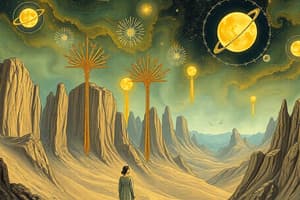Podcast
Questions and Answers
What does geology investigate in Earth science?
What does geology investigate in Earth science?
The physical structure and composition of our planet.
How do geologists use rocks and fossils in their study?
How do geologists use rocks and fossils in their study?
To piece together stories about Earth's past.
What theory has helped scientists explain continental drift?
What theory has helped scientists explain continental drift?
Plate tectonics.
What does the hydrosphere encompass in Earth science?
What does the hydrosphere encompass in Earth science?
Name one example of a water system in the hydrosphere.
Name one example of a water system in the hydrosphere.
What aspect of Earth science focuses on the cycling of water through rocks?
What aspect of Earth science focuses on the cycling of water through rocks?
What does hydrology study?
What does hydrology study?
What is the atmosphere made of?
What is the atmosphere made of?
What is ecology focused on studying?
What is ecology focused on studying?
How do human activities impact the biosphere?
How do human activities impact the biosphere?
What does meteorology study?
What does meteorology study?
What is the biosphere?
What is the biosphere?
Flashcards are hidden until you start studying
Study Notes
Discovering the Wonders of Our Planet: Earth Science
Earth science is a dynamic field that investigates our home planet—from its physical makeup to the life that flourishes upon it. It's a subject that incorporates several disciplines, including geology, atmospheric science, oceanography, and ecology. In this exploration of Earth science, we'll delve into the realms of our planet's geology, hydrosphere, atmosphere, and biosphere.
Earth's Rocky Foundation: Geology
At the core of Earth science, geology investigates the physical structure and composition of our planet. Geologists study the Earth's crust, mantle, and core, and how they interact to create the landscapes and features we observe today. In geology, we learn about the processes that have shaped our planet, such as mountain-building, volcanic eruptions, and the cycling of water and nutrients through rocks.
Geology is also concerned with the history of Earth, using the evidence found in rocks and fossils to piece together stories about our planet's past. For instance, understanding plate tectonics, a theory describing how Earth's crust moves and interacts, has helped scientists piece together the story of continental drift, which has led to new insights about the geological history of our planet and its climate.
Fluid Dynamics: Hydrosphere
The hydrosphere encompasses Earth's water systems, including oceans, lakes, rivers, and groundwater. Hydrology, the scientific study of water, investigates the movement, distribution, and quality of water on Earth. Hydrologists study everything from the water cycle to the impact of human activities on water bodies, such as deforestation, dam construction, and pollution.
In studying the hydrosphere, we learn about the interactions between water and other components of the Earth system, including the atmosphere, biosphere, and geosphere. We discover how water drives processes like weather and climate, supports life, and contributes to the maintenance of our planet's physical features.
Air and Weather: Atmosphere
The atmosphere is a thin layer of gases that envelopes our planet, providing the conditions that sustain life on Earth. Meteorology, the scientific study of the atmosphere, investigates the processes that govern Earth's weather and climate. Meteorologists study everything from the behavior of clouds and storms to long-term changes in temperature and precipitation patterns.
In studying the atmosphere, we learn about the interactions between water, energy, and matter that drive Earth's climate system. We discover how the atmosphere influences our planet's water cycles, affects the distribution of nutrients, and shapes the landscapes we inhabit. We also gain insights about how human activities are altering the atmosphere, and the potential consequences of these changes for our planet's future.
Sustaining Habitat: Biosphere
The biosphere is the thin layer of our planet where life exists. Ecology, the scientific study of interactions among organisms and their environment, investigates the processes that govern life on Earth. Ecologists study everything from individual species to the complex interactions between species and their physical environments.
In studying the biosphere, we learn about the relationships between living organisms and their environments. We discover how life influences the physical and chemical properties of our planet, and how Earth's physical and chemical properties in turn influence life. We also gain insights about how human activities are altering Earth's ecosystems, and the potential consequences of these changes for our planet's future.
Conclusion
Earth science is a vibrant field that investigates the physical, chemical, and biological processes that govern our planet. By exploring the disciplines that constitute Earth science, we gain a deeper understanding of our planet's past, present, and future. We learn about the interactions between our planet's components, and the processes that drive Earth's climate system. We also gain insights about how human activities are altering our planet, and the potential consequences of these changes for our future.
The study of Earth science is essential for understanding our planet's history, and for ensuring its future sustainability. By exploring Earth science, we gain the knowledge needed to make informed decisions about our planet's future. And by encouraging curiosity and exploration, we inspire the next generation of scientists who will continue to delve deeper into the mysteries of our planet.
Studying That Suits You
Use AI to generate personalized quizzes and flashcards to suit your learning preferences.




